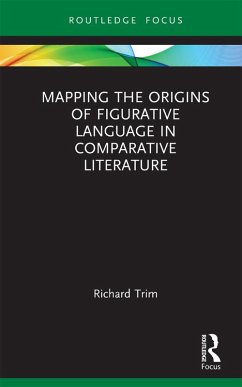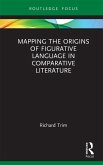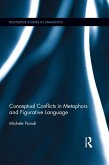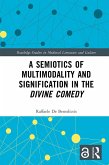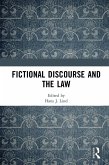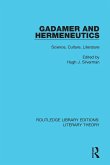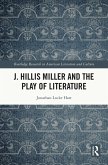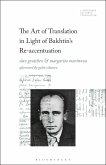Richard Trim
Mapping the Origins of Figurative Language in Comparative Literature (eBook, PDF)
22,95 €
22,95 €
inkl. MwSt.
Sofort per Download lieferbar

11 °P sammeln
22,95 €
Als Download kaufen

22,95 €
inkl. MwSt.
Sofort per Download lieferbar

11 °P sammeln
Jetzt verschenken
Alle Infos zum eBook verschenken
22,95 €
inkl. MwSt.
Sofort per Download lieferbar
Alle Infos zum eBook verschenken

11 °P sammeln
Richard Trim
Mapping the Origins of Figurative Language in Comparative Literature (eBook, PDF)
- Format: PDF
- Merkliste
- Auf die Merkliste
- Bewerten Bewerten
- Teilen
- Produkt teilen
- Produkterinnerung
- Produkterinnerung

Bitte loggen Sie sich zunächst in Ihr Kundenkonto ein oder registrieren Sie sich bei
bücher.de, um das eBook-Abo tolino select nutzen zu können.
Hier können Sie sich einloggen
Hier können Sie sich einloggen
Sie sind bereits eingeloggt. Klicken Sie auf 2. tolino select Abo, um fortzufahren.

Bitte loggen Sie sich zunächst in Ihr Kundenkonto ein oder registrieren Sie sich bei bücher.de, um das eBook-Abo tolino select nutzen zu können.
This book investigates the origins of figurative language in literary discourse within a cognitive framework. It represents an interface between linguistics and literature and develops a 6-tier theoretical model which analyses the different factors contributing to the creation of figurative words and expressions.
- Geräte: PC
- mit Kopierschutz
- eBook Hilfe
Andere Kunden interessierten sich auch für
![Mapping the Origins of Figurative Language in Comparative Literature (eBook, ePUB) Mapping the Origins of Figurative Language in Comparative Literature (eBook, ePUB)]() Richard TrimMapping the Origins of Figurative Language in Comparative Literature (eBook, ePUB)22,95 €
Richard TrimMapping the Origins of Figurative Language in Comparative Literature (eBook, ePUB)22,95 €![Conceptual Conflicts in Metaphors and Figurative Language (eBook, PDF) Conceptual Conflicts in Metaphors and Figurative Language (eBook, PDF)]() Michele PrandiConceptual Conflicts in Metaphors and Figurative Language (eBook, PDF)46,95 €
Michele PrandiConceptual Conflicts in Metaphors and Figurative Language (eBook, PDF)46,95 €![A Semiotics of Multimodality and Signification in the Divine Comedy (eBook, PDF) A Semiotics of Multimodality and Signification in the Divine Comedy (eBook, PDF)]() Raffaele De BenedictisA Semiotics of Multimodality and Signification in the Divine Comedy (eBook, PDF)40,95 €
Raffaele De BenedictisA Semiotics of Multimodality and Signification in the Divine Comedy (eBook, PDF)40,95 €![Fictional Discourse and the Law (eBook, PDF) Fictional Discourse and the Law (eBook, PDF)]() Fictional Discourse and the Law (eBook, PDF)43,95 €
Fictional Discourse and the Law (eBook, PDF)43,95 €![Gadamer and Hermeneutics (eBook, PDF) Gadamer and Hermeneutics (eBook, PDF)]() Gadamer and Hermeneutics (eBook, PDF)39,95 €
Gadamer and Hermeneutics (eBook, PDF)39,95 €![J. Hillis Miller and the Play of Literature (eBook, PDF) J. Hillis Miller and the Play of Literature (eBook, PDF)]() Jonathan Locke HartJ. Hillis Miller and the Play of Literature (eBook, PDF)44,95 €
Jonathan Locke HartJ. Hillis Miller and the Play of Literature (eBook, PDF)44,95 €![The Art of Translation in Light of Bakhtin's Re-accentuation (eBook, PDF) The Art of Translation in Light of Bakhtin's Re-accentuation (eBook, PDF)]() The Art of Translation in Light of Bakhtin's Re-accentuation (eBook, PDF)25,95 €
The Art of Translation in Light of Bakhtin's Re-accentuation (eBook, PDF)25,95 €-
-
-
This book investigates the origins of figurative language in literary discourse within a cognitive framework. It represents an interface between linguistics and literature and develops a 6-tier theoretical model which analyses the different factors contributing to the creation of figurative words and expressions.
Hinweis: Dieser Artikel kann nur an eine deutsche Lieferadresse ausgeliefert werden.
Dieser Download kann aus rechtlichen Gründen nur mit Rechnungsadresse in A, B, BG, CY, CZ, D, DK, EW, E, FIN, F, GR, HR, H, IRL, I, LT, L, LR, M, NL, PL, P, R, S, SLO, SK ausgeliefert werden.
Hinweis: Dieser Artikel kann nur an eine deutsche Lieferadresse ausgeliefert werden.
Produktdetails
- Produktdetails
- Verlag: Taylor & Francis eBooks
- Seitenzahl: 146
- Erscheinungstermin: 5. Oktober 2021
- Englisch
- ISBN-13: 9781000482362
- Artikelnr.: 62652369
- Verlag: Taylor & Francis eBooks
- Seitenzahl: 146
- Erscheinungstermin: 5. Oktober 2021
- Englisch
- ISBN-13: 9781000482362
- Artikelnr.: 62652369
- Herstellerkennzeichnung Die Herstellerinformationen sind derzeit nicht verfügbar.
Richard Trim is Professor Emeritus in linguistics at the University of Toulon, France. His interest in the study of figurative language covers a wide variety of fields including historical linguistics, contrastive linguistics and translation with the analysis of corpora in both political and literary discourse. He has published widely in these different areas in the form of journal articles, the editing of conference proceedings, book reviews and monographs.
1. Towards a global model of figurative origins
1. Conceptual mapping
2. Overview of mappings in pandemic poetry
3. Cultural versus universal features
4. Linguistic structures
5. Poetic licence
2. Figurative creativity in language structure
1. The power of figurative language
2. Old and new words
3. Composite structures
4. Morpho-syntax and stylistic effects
5. Neologisms
3. Cross-language evidence for the limits of linguistic creation
1. Linguistic relativity
2. Translating language structures
3. Language distance
4. Innovative morphology
5. Metaphor versus simile
6. Dating translation
7. Composite order and semantics
8. Symbolic features
4. Underlying figurative thought
1. Cross-language imagery
2. Cognitive theories
3. Individual conceptualisation
4. Cognitive linguistics
5. Metaphor and symbol
6. Cognitive and conflictual paradigms
5. Tracing cultural history
1. Diachronic conceptual networking
2. Diachronic salience
3. Historical origins of figurative words
4. The love/death conceptual metaphor
5. Understanding figurative language in Early Modern English
6. Theories of reference in conceptual mapping
1. Extra-linguistic reference
2. Mental spaces
3. Possible worlds and discourse worlds
4. Reference in conceptual mappings
5. Philosophy and reference
6. Hidden reference theory
7. Textual reference
7. Textual reference in the form of narrative
1. Variants of love
2. Social attitudes in D.H. Lawrence
3. Existentialism in Simone De Beauvoir
4. Personal psychology in Hermann Hesse
8. Personal biography in figurative language
1. Narrative and personal biography
2. "Distortion" of personal lives
3. Criticism of biographical theories
4. Autobiography and autofiction
5. Individual biographies
6. Symbolic influence in D.H. Lawrence
7. The philosophical background to Simone De Beauvoir
8. Freudian psychology in Hermann Hesse
9. Real and non-real worlds
9. Conceptualisation of the real world
1. Time trajectories in literal meaning
2. Multicultural conceptualisation of time and space
3. Time and space in literary thought
4. Conceptualisation and beliefs in Emily Dickinson
10. The transformation of reality
1. The Venezuelan poet Eugenio Montejo
2. Transfigured time
3. Time symbolism and language structure
4. Switching between past and future
5. New spatial forms
6. Notions of real worlds
11. Multiple conceptual mapping
1. The symbolic notion of "The South" in Jorge Luis Borges
2. The background to Borges' life
3. Narratological conceptual mappings
4. Language-specific symbolism in Borges
5. Fantasy and the defiance of death
12. The overall picture
1. Conceptual mapping
2. Overview of mappings in pandemic poetry
3. Cultural versus universal features
4. Linguistic structures
5. Poetic licence
2. Figurative creativity in language structure
1. The power of figurative language
2. Old and new words
3. Composite structures
4. Morpho-syntax and stylistic effects
5. Neologisms
3. Cross-language evidence for the limits of linguistic creation
1. Linguistic relativity
2. Translating language structures
3. Language distance
4. Innovative morphology
5. Metaphor versus simile
6. Dating translation
7. Composite order and semantics
8. Symbolic features
4. Underlying figurative thought
1. Cross-language imagery
2. Cognitive theories
3. Individual conceptualisation
4. Cognitive linguistics
5. Metaphor and symbol
6. Cognitive and conflictual paradigms
5. Tracing cultural history
1. Diachronic conceptual networking
2. Diachronic salience
3. Historical origins of figurative words
4. The love/death conceptual metaphor
5. Understanding figurative language in Early Modern English
6. Theories of reference in conceptual mapping
1. Extra-linguistic reference
2. Mental spaces
3. Possible worlds and discourse worlds
4. Reference in conceptual mappings
5. Philosophy and reference
6. Hidden reference theory
7. Textual reference
7. Textual reference in the form of narrative
1. Variants of love
2. Social attitudes in D.H. Lawrence
3. Existentialism in Simone De Beauvoir
4. Personal psychology in Hermann Hesse
8. Personal biography in figurative language
1. Narrative and personal biography
2. "Distortion" of personal lives
3. Criticism of biographical theories
4. Autobiography and autofiction
5. Individual biographies
6. Symbolic influence in D.H. Lawrence
7. The philosophical background to Simone De Beauvoir
8. Freudian psychology in Hermann Hesse
9. Real and non-real worlds
9. Conceptualisation of the real world
1. Time trajectories in literal meaning
2. Multicultural conceptualisation of time and space
3. Time and space in literary thought
4. Conceptualisation and beliefs in Emily Dickinson
10. The transformation of reality
1. The Venezuelan poet Eugenio Montejo
2. Transfigured time
3. Time symbolism and language structure
4. Switching between past and future
5. New spatial forms
6. Notions of real worlds
11. Multiple conceptual mapping
1. The symbolic notion of "The South" in Jorge Luis Borges
2. The background to Borges' life
3. Narratological conceptual mappings
4. Language-specific symbolism in Borges
5. Fantasy and the defiance of death
12. The overall picture
- Towards a global model of figurative origins
- Conceptual mapping
- Overview of mappings in pandemic poetry
- Cultural versus universal features
- Linguistic structures
- Poetic licence
- Figurative creativity in language structure
- The power of figurative language
- Old and new words
- Composite structures
- Morpho-syntax and stylistic effects
- Neologisms
- Cross-language evidence for the limits of linguistic creation
- Linguistic relativity
- Translating language structures
- Language distance
- Innovative morphology
- Metaphor versus simile
- Dating translation
- Composite order and semantics
- Symbolic features
- Underlying figurative thought
- Cross-language imagery
- Cognitive theories
- Individual conceptualisation
- Cognitive linguistics
- Metaphor and symbol
- Cognitive and conflictual paradigms
- Tracing cultural history
- Diachronic conceptual networking
- Diachronic salience
- Historical origins of figurative words
- The love/death conceptual metaphor
- Understanding figurative language in Early Modern English
- Theories of reference in conceptual mapping
- Extra-linguistic reference
- Mental spaces
- Possible worlds and discourse worlds
- Reference in conceptual mappings
- Philosophy and reference
- Hidden reference theory
- Textual reference
- Textual reference in the form of narrative
- Variants of love
- Social attitudes in D.H. Lawrence
- Existentialism in Simone De Beauvoir
- Personal psychology in Hermann Hesse
- Personal biography in figurative language
- Narrative and personal biography
- "Distortion" of personal lives
- Criticism of biographical theories
- Autobiography and autofiction
- Individual biographies
- Symbolic influence in D.H. Lawrence
- The philosophical background to Simone De Beauvoir
- Freudian psychology in Hermann Hesse
- Real and non-real worlds
- Conceptualisation of the real world
- Time trajectories in literal meaning
- Multicultural conceptualisation of time and space
- Time and space in literary thought
- Conceptualisation and beliefs in Emily Dickinson
- The transformation of reality
- The Venezuelan poet Eugenio Montejo
- Transfigured time
- Time symbolism and language structure
- Switching between past and future
- New spatial forms
- Notions of real worlds
- Multiple conceptual mapping
- The symbolic notion of "The South" in Jorge Luis Borges
- The background to Borges' life
- Narratological conceptual mappings
- Language-specific symbolism in Borges
- Fantasy and the defiance of death
- The overall picture
1. Towards a global model of figurative origins
1. Conceptual mapping
2. Overview of mappings in pandemic poetry
3. Cultural versus universal features
4. Linguistic structures
5. Poetic licence
2. Figurative creativity in language structure
1. The power of figurative language
2. Old and new words
3. Composite structures
4. Morpho-syntax and stylistic effects
5. Neologisms
3. Cross-language evidence for the limits of linguistic creation
1. Linguistic relativity
2. Translating language structures
3. Language distance
4. Innovative morphology
5. Metaphor versus simile
6. Dating translation
7. Composite order and semantics
8. Symbolic features
4. Underlying figurative thought
1. Cross-language imagery
2. Cognitive theories
3. Individual conceptualisation
4. Cognitive linguistics
5. Metaphor and symbol
6. Cognitive and conflictual paradigms
5. Tracing cultural history
1. Diachronic conceptual networking
2. Diachronic salience
3. Historical origins of figurative words
4. The love/death conceptual metaphor
5. Understanding figurative language in Early Modern English
6. Theories of reference in conceptual mapping
1. Extra-linguistic reference
2. Mental spaces
3. Possible worlds and discourse worlds
4. Reference in conceptual mappings
5. Philosophy and reference
6. Hidden reference theory
7. Textual reference
7. Textual reference in the form of narrative
1. Variants of love
2. Social attitudes in D.H. Lawrence
3. Existentialism in Simone De Beauvoir
4. Personal psychology in Hermann Hesse
8. Personal biography in figurative language
1. Narrative and personal biography
2. "Distortion" of personal lives
3. Criticism of biographical theories
4. Autobiography and autofiction
5. Individual biographies
6. Symbolic influence in D.H. Lawrence
7. The philosophical background to Simone De Beauvoir
8. Freudian psychology in Hermann Hesse
9. Real and non-real worlds
9. Conceptualisation of the real world
1. Time trajectories in literal meaning
2. Multicultural conceptualisation of time and space
3. Time and space in literary thought
4. Conceptualisation and beliefs in Emily Dickinson
10. The transformation of reality
1. The Venezuelan poet Eugenio Montejo
2. Transfigured time
3. Time symbolism and language structure
4. Switching between past and future
5. New spatial forms
6. Notions of real worlds
11. Multiple conceptual mapping
1. The symbolic notion of "The South" in Jorge Luis Borges
2. The background to Borges' life
3. Narratological conceptual mappings
4. Language-specific symbolism in Borges
5. Fantasy and the defiance of death
12. The overall picture
1. Conceptual mapping
2. Overview of mappings in pandemic poetry
3. Cultural versus universal features
4. Linguistic structures
5. Poetic licence
2. Figurative creativity in language structure
1. The power of figurative language
2. Old and new words
3. Composite structures
4. Morpho-syntax and stylistic effects
5. Neologisms
3. Cross-language evidence for the limits of linguistic creation
1. Linguistic relativity
2. Translating language structures
3. Language distance
4. Innovative morphology
5. Metaphor versus simile
6. Dating translation
7. Composite order and semantics
8. Symbolic features
4. Underlying figurative thought
1. Cross-language imagery
2. Cognitive theories
3. Individual conceptualisation
4. Cognitive linguistics
5. Metaphor and symbol
6. Cognitive and conflictual paradigms
5. Tracing cultural history
1. Diachronic conceptual networking
2. Diachronic salience
3. Historical origins of figurative words
4. The love/death conceptual metaphor
5. Understanding figurative language in Early Modern English
6. Theories of reference in conceptual mapping
1. Extra-linguistic reference
2. Mental spaces
3. Possible worlds and discourse worlds
4. Reference in conceptual mappings
5. Philosophy and reference
6. Hidden reference theory
7. Textual reference
7. Textual reference in the form of narrative
1. Variants of love
2. Social attitudes in D.H. Lawrence
3. Existentialism in Simone De Beauvoir
4. Personal psychology in Hermann Hesse
8. Personal biography in figurative language
1. Narrative and personal biography
2. "Distortion" of personal lives
3. Criticism of biographical theories
4. Autobiography and autofiction
5. Individual biographies
6. Symbolic influence in D.H. Lawrence
7. The philosophical background to Simone De Beauvoir
8. Freudian psychology in Hermann Hesse
9. Real and non-real worlds
9. Conceptualisation of the real world
1. Time trajectories in literal meaning
2. Multicultural conceptualisation of time and space
3. Time and space in literary thought
4. Conceptualisation and beliefs in Emily Dickinson
10. The transformation of reality
1. The Venezuelan poet Eugenio Montejo
2. Transfigured time
3. Time symbolism and language structure
4. Switching between past and future
5. New spatial forms
6. Notions of real worlds
11. Multiple conceptual mapping
1. The symbolic notion of "The South" in Jorge Luis Borges
2. The background to Borges' life
3. Narratological conceptual mappings
4. Language-specific symbolism in Borges
5. Fantasy and the defiance of death
12. The overall picture
- Towards a global model of figurative origins
- Conceptual mapping
- Overview of mappings in pandemic poetry
- Cultural versus universal features
- Linguistic structures
- Poetic licence
- Figurative creativity in language structure
- The power of figurative language
- Old and new words
- Composite structures
- Morpho-syntax and stylistic effects
- Neologisms
- Cross-language evidence for the limits of linguistic creation
- Linguistic relativity
- Translating language structures
- Language distance
- Innovative morphology
- Metaphor versus simile
- Dating translation
- Composite order and semantics
- Symbolic features
- Underlying figurative thought
- Cross-language imagery
- Cognitive theories
- Individual conceptualisation
- Cognitive linguistics
- Metaphor and symbol
- Cognitive and conflictual paradigms
- Tracing cultural history
- Diachronic conceptual networking
- Diachronic salience
- Historical origins of figurative words
- The love/death conceptual metaphor
- Understanding figurative language in Early Modern English
- Theories of reference in conceptual mapping
- Extra-linguistic reference
- Mental spaces
- Possible worlds and discourse worlds
- Reference in conceptual mappings
- Philosophy and reference
- Hidden reference theory
- Textual reference
- Textual reference in the form of narrative
- Variants of love
- Social attitudes in D.H. Lawrence
- Existentialism in Simone De Beauvoir
- Personal psychology in Hermann Hesse
- Personal biography in figurative language
- Narrative and personal biography
- "Distortion" of personal lives
- Criticism of biographical theories
- Autobiography and autofiction
- Individual biographies
- Symbolic influence in D.H. Lawrence
- The philosophical background to Simone De Beauvoir
- Freudian psychology in Hermann Hesse
- Real and non-real worlds
- Conceptualisation of the real world
- Time trajectories in literal meaning
- Multicultural conceptualisation of time and space
- Time and space in literary thought
- Conceptualisation and beliefs in Emily Dickinson
- The transformation of reality
- The Venezuelan poet Eugenio Montejo
- Transfigured time
- Time symbolism and language structure
- Switching between past and future
- New spatial forms
- Notions of real worlds
- Multiple conceptual mapping
- The symbolic notion of "The South" in Jorge Luis Borges
- The background to Borges' life
- Narratological conceptual mappings
- Language-specific symbolism in Borges
- Fantasy and the defiance of death
- The overall picture
"Using evidence from internationally known and appreciated poets and writers, Richard Trim offers a novel and powerful account of how figurative language, especially metaphor, emerges in literary texts. The 6-step process he outlines is the most complete investigation to date of the issue of why and how authors use particular metaphors in their works".
Professor Zoltán Kövecses, Loránd Eötvös University, Budapest, Hungary
Professor Zoltán Kövecses, Loránd Eötvös University, Budapest, Hungary
